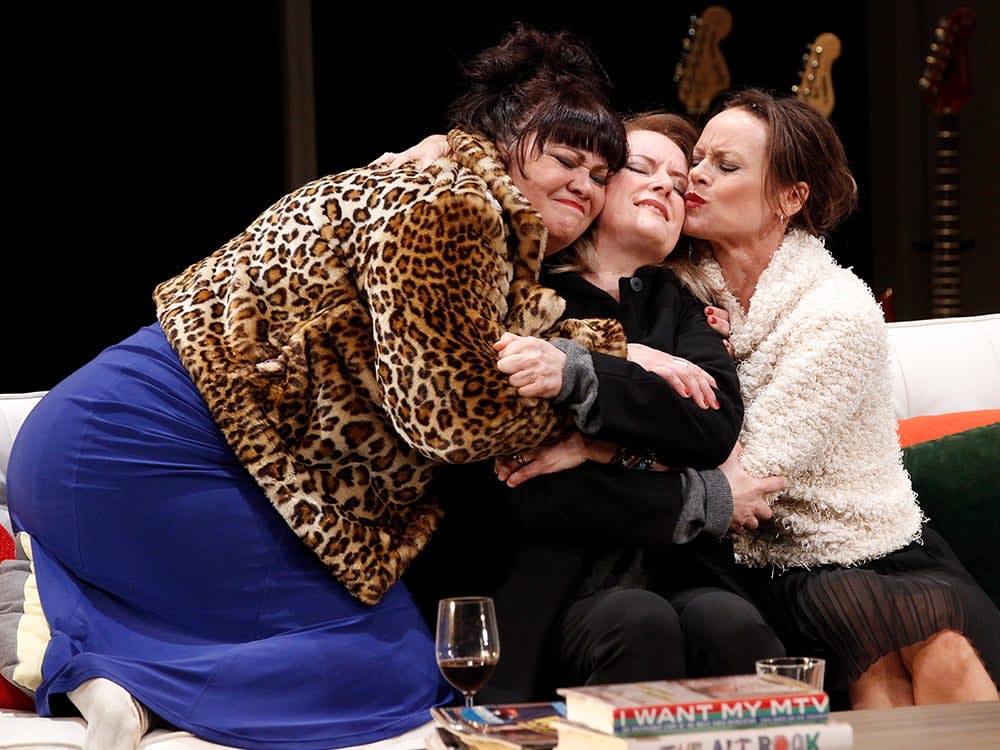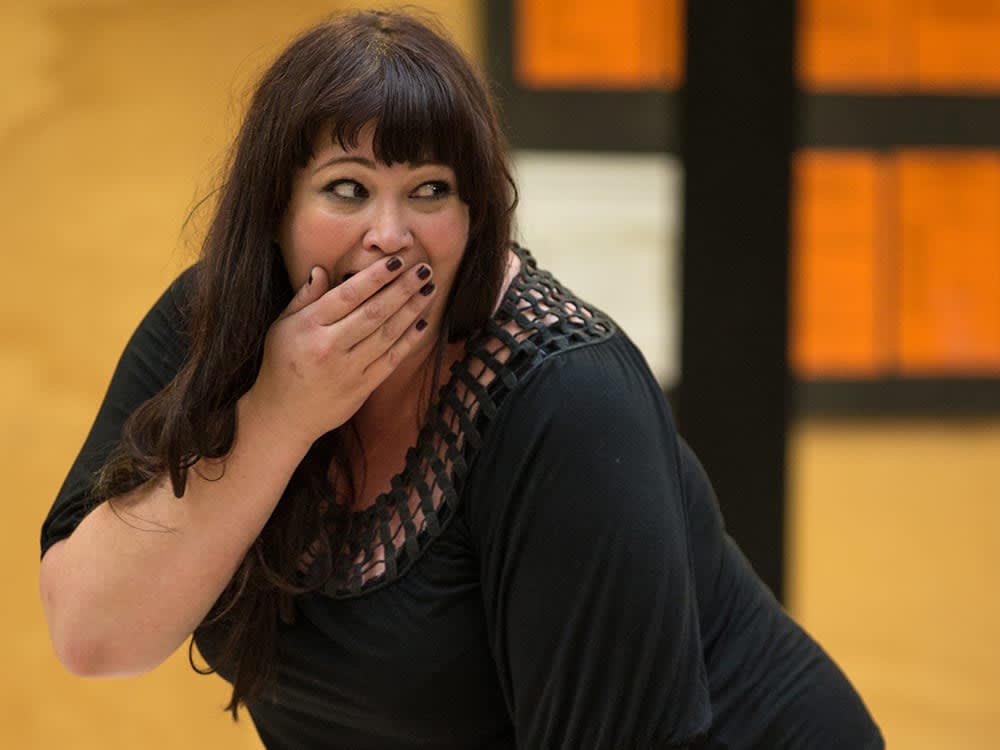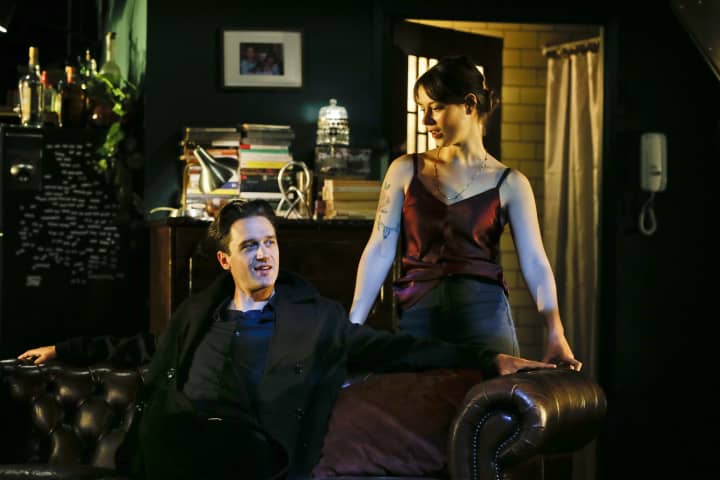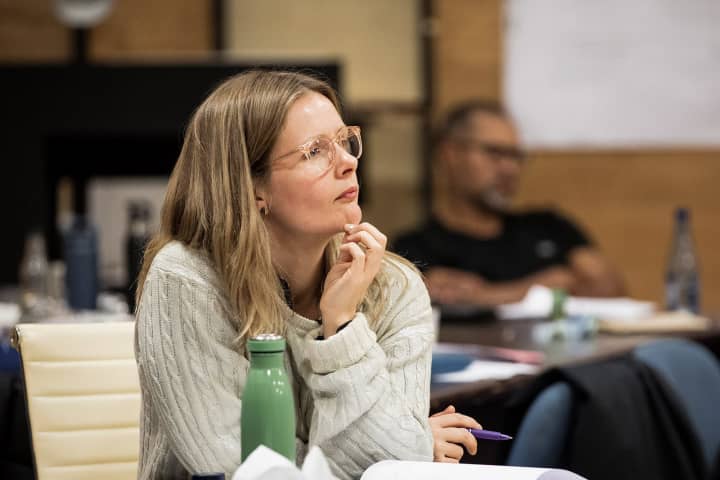From Oscar-winner Florian Zeller, The Truth finds two married couples navigating a complicated web of deceptions and revelations that continually upend their own assumptions. Its actors, however, are more forthcoming. Here, Katrina Milosevic reveals the truth, as she sees it, about acting, Melbourne and herself.
The truth about … acting
What’s the most common misconception about working as an actor, especially on stage?
There are a couple. I’ve found that a lot of people equate acting with facial expressions, and the truth of the matter is that you’re not really aware of what your face is doing because you’re trying to impact the other character. That’s one misconception; and the other is that it’s lying. This is a weird one: acting is pretending so effectively it’s lying, but the actor is in pursuit of the truth: you’re inhabiting a character, and you have to empathise entirely with that character and understand why and how. So it’s quite a weird kind of dichotomy. It’s a weird and strange job!
Speaking of, what’s the weirdest audience moment you’ve encountered to date?
There have been many. Many, many, many! One that springs to mind was, funnily enough, in a theatre but I was in the theatre for a television show, for an audience meet and greet. And a man popped up out of the audience offering to have a baby with me! That was confronting. My character desperately wanted a baby and I guess he thought he was just being kind – but it was kind of freaky.
Another time I was doing a show at Sydney Theatre Company, and a woman in the front row bought a Dalmatian-print coat that seemed to stretch the whole first row, and she had spread it right out. When you’re on stage your senses are so heightened that you can hear every sniffle, sneeze, shuffle, everything. So to have a giant Dalmatian blanket across the front row was really weird and interesting!
What’s the best thing about working in this industry?
There are many amazing things about working in this industry. I always say it’s actually not the industry that I like, it’s the job itself, and it’s the people and the like mindedness. It’s finding your tribe, which is all anyone ever wants to do: to find some where to belong, or someone who speaks their language, for want of a better phrase.
And the fun, the laughter! There are so many funny, gorgeous, generous and kind souls. It’s that family aspect, and the sense of having been through something with people. When you put a show on, you go through something with everyone working on the show, and that bunch of people always have that shared knowledge that we did this together. It just always comes back to those really core human needs: to belong, to find family, to find love and be loved. That’s what's most beautiful about it.

Katrina Milosevic, Susan Prior and Nadine Garner in The Distance. Photo: Jeff Busby
The truth about … Melbourne
What’s the most common misconception the rest of the country/world has about Melbourne?
I think the most common misconception about Melbourne is that it’s not an attractive city like Sydney. But it is! Sydney has it all on show. Whereas Melbourne is a process of discovery, and when you open the door to that laneway or to that pocket, it’s really special . There’s a freedom in Melbourne, a freedom of thought and freedom of expression, that I don’t find anywhere else in Australia, and I love that. I love it.
What’s the worst things about Melbourne?
The worst thing about Melbourne is the myki system. I hate it, and it makes no sense to me that you have to have money on a myki that you can’t actually top up easily or check at all bus train stops, and it just does my head in. I miss the conductors; I moved here just as they were phasing them out, but I miss them. That was a good, human aspect of Melbourne public transport that is all gone now. Replacing conductors with officers who are there to fine you for not having a ticket is really underhanded. And you can always spot them a mile away: they look so uncomfortable in their tracky dacks. Who is uncomfortable in tracky dacks?!

Katrina Milosevic. Photo: Gina Milicia
The truth about … Katrina Milosevic
What’s the biggest misconception the public has about you?
One springs to mind immediately. It was actually when I was doing The Distance here at the MTC, and there was a reviewer, who will remain nameless, who said that it was obvious to her that people were only finding me funny because I looked like Dawn French. And that was it. In that moment I really wished there was a right of reply. How did they assess this? Did they do a survey? I love Dawn French – she’s actually one of my idols and I’ll take the compliment – but at the same time I felt really insulted that all my hard work and my years of slogging away were reduced to ‘because I look like someone’. It broke my heart a bit. I hate that aspect of what we do; and it’s kind of useless – I wish we did it more about governmental decisions than we do with art.
What’s your most formative or memorable acting experience?
I remember the day I was tasked with giving a speech at school, and the teacher had asked us to prepare the most boring speech we could think of. I did one about a teapot; I put so much into it and I really tried to create this character to give the other kids every bit of knowledge about a teapot. I really did milk it, and the kids laughed. And it was the first time I felt accepted.
That was one of my first experiences, but NIDA was a life-changing experience for me just because of what I learned, and the pressure and the circumstances in which you have to learn. And the discipline it gives you has pretty stayed with me.
What is the best lie you’ve ever told?
I think I’m an honest person. No, I’m a lazy person and to lie takes a lot of energy and effort, and I would rather just tell you what I think. Even with little white lies – sometimes if I’m having a crappy day and someone says ‘how are you?’ and I reply ‘I’m good’ I just end up hating myself because I feel like I’m lying. I really want to sit them down and go ‘you know what happened…’ but no one wants to hear that in response to what’s meant to be a generic greeting. So you’re damned if you do and damned if you don’t: you have to lie every day.
It’s so funny how we have these little rituals that don’t mean anything other than ‘hello, I acknowledge you’re here.’ And that’s kind of what the playwright of our play says. In fact that’s exactly what he says. ‘The advantages of concealing the truth, and the drawbacks of revealing it.’ And yet we’re all drawn to the more positive framing, which is: I tell the truth. But when you examine things more closely, do you? Do you really?
Published on 26 May 2021





